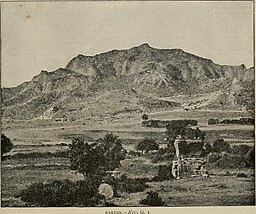“And to the angel of the church in Philadelphia write, ‘These things says He who is holy, He who is true, “He who has the key of David, He who opens and no one shuts, and shuts and no one opens”” (Revelation 3:7).
Revelation 3:7 marks a transition to the next message in a series of letters that Jesus sent to seven first-century churches in the book of Revelation. Our next letter was delivered to the church that met in the ancient city of Philadelphia.
 In contrast to the cities of Ephesus, Smyrna, and Thyatira mentioned earlier, the economic landscape in the ancient city of Philadelphia was primarily agricultural. Philadelphia reportedly featured some exceptional vineyards that likely benefited from the fertile soil produced by that region’s volcanic history. While this offered some definite advantages, it also came with a significant drawback: Philadelphia was situated in an area that was susceptible to earthquakes.
In contrast to the cities of Ephesus, Smyrna, and Thyatira mentioned earlier, the economic landscape in the ancient city of Philadelphia was primarily agricultural. Philadelphia reportedly featured some exceptional vineyards that likely benefited from the fertile soil produced by that region’s volcanic history. While this offered some definite advantages, it also came with a significant drawback: Philadelphia was situated in an area that was susceptible to earthquakes.
Much like the city of Sardis, Philadelphia was also devastated by the earthquake that took place in A.D. 17. Although the city was later rebuilt and repopulated, Philadelphia is said to have suffered from regional aftershocks for several years following that quake. That unfortunate reality may shed light on certain elements of Jesus’ letter to this church.
Yet even in the face of those adversities, the Christian community in Philadelphia remained faithful in their relationship with Christ. Of the seven churches addressed by Jesus in the Book of Revelation, only two received praise from Him without any negative feedback. The first was located in the city of Smyrna and the second was located here in Philadelphia.
There are many positive takeaways from Jesus’ letter to this church, but the first has nothing to do with the church itself. Instead, our first application concerns this letter’s Author. You see, Jesus opened His letter to this church with two important self-designations: holy and true.
The word “holy’ conveys the idea of something that is “set apart.” It also embodies the concept of absolute moral purity. So “holiness” tells us that Jesus is ethically spotless and completely devoid of anything that may be wrong, dirty, or impure. Next comes the word “true.” This word denotes something that is genuine and authentic, in contrast to anything that may be false, hypocritical, or insincere.
While there were many so-called “gods” in first-century era (as there are today), none of those alleged gods could accurately make such claims. So, truth and holiness are not simply attributes of Jesus’ character; they are who He is.
Image Credit: Philadelphia by Nick Youngson CC BY-SA 3.0 Pix4free


 However, it is important to note that Jesus drew a connection between the behavior of some in Sardis (those who “…soiled their clothes” [NIV]) and their resulting spiritual impurity. This underscores the impact of our choices on our spiritual well-being. When we engage in behaviors that are inconsistent with our profession of faith, we effectively stain our spiritual attire, much like a splatter of mud on a pristine white robe.
However, it is important to note that Jesus drew a connection between the behavior of some in Sardis (those who “…soiled their clothes” [NIV]) and their resulting spiritual impurity. This underscores the impact of our choices on our spiritual well-being. When we engage in behaviors that are inconsistent with our profession of faith, we effectively stain our spiritual attire, much like a splatter of mud on a pristine white robe. This portion of Jesus’ message to the church at Sardis functions as a series of steps that lead us to an important destination. We can begin by considering Jesus’ counsel to “remember” in this passage. If Jesus told the ancient church at Sardis to “remember,” then it can only mean they had forgotten something. That leads us to a question that constitutes step two: what had they forgotten? Well, Jesus answered that question when He advised them to remember what they had “received and heard.”
This portion of Jesus’ message to the church at Sardis functions as a series of steps that lead us to an important destination. We can begin by considering Jesus’ counsel to “remember” in this passage. If Jesus told the ancient church at Sardis to “remember,” then it can only mean they had forgotten something. That leads us to a question that constitutes step two: what had they forgotten? Well, Jesus answered that question when He advised them to remember what they had “received and heard.” A key attribute of a good church lies in its capacity to prepare its members to undertake the work God has called them to do. On the other hand, a church with a good reputation that fails to help its members understand and apply God’s Word will likely fail in it’s mission to help them fulfill God’s will in their lives.
A key attribute of a good church lies in its capacity to prepare its members to undertake the work God has called them to do. On the other hand, a church with a good reputation that fails to help its members understand and apply God’s Word will likely fail in it’s mission to help them fulfill God’s will in their lives. At one time, Sardis was reported to be one of the more prominent cities of the ancient world. The city was strategically positioned on an elevated ridge that was surrounded by mountainous cliffs that presented a formidable obstacle to any military force that might try to mount an invasion. Of course, “difficult to invade” is not the same as “impossible to invade,” but we’ll address that distinction in greater detail shortly.
At one time, Sardis was reported to be one of the more prominent cities of the ancient world. The city was strategically positioned on an elevated ridge that was surrounded by mountainous cliffs that presented a formidable obstacle to any military force that might try to mount an invasion. Of course, “difficult to invade” is not the same as “impossible to invade,” but we’ll address that distinction in greater detail shortly. But those who seek to know Christ as He is revealed to us in the Biblical Scriptures have no need to pursue these “deeper truths.” The following excerpt from the New Testament book of 2 Peter brings an important perspective to this idea…
But those who seek to know Christ as He is revealed to us in the Biblical Scriptures have no need to pursue these “deeper truths.” The following excerpt from the New Testament book of 2 Peter brings an important perspective to this idea…